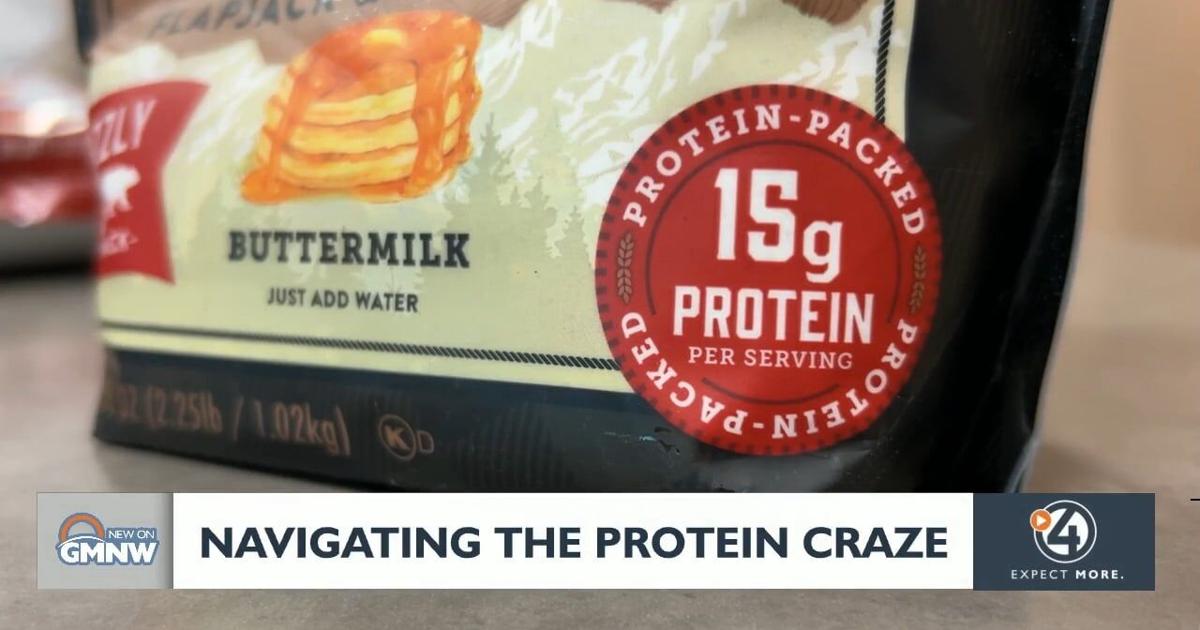SPOKANE, Wash — Protein has become ubiquitous in grocery stores, appearing in everything from peanut butter and jelly sandwiches to morning lattes. The protein-enhanced product trend has left many consumers wondering whether they need the extra nutritional boost or if they’re consuming too much.
For years, protein supplements through bars and shakes have targeted fitness enthusiasts looking to build muscle and stay full. Now, traditionally non-protein-packed products are adding extra protein, creating anxiety for some shoppers about their dietary choices.
“It’s like the fun house at the grocery store with the extra protein, protein, protein to make you go, ‘Am I doing enough?'” said Stephanie Flora, a registered dietitian at Rooted Nutrition Counseling in Spokane.
Hannah McLeod, a Spokane mother of three, represents many parents navigating the protein messaging. She makes a conscious effort to include protein in every meal for her family.
“It is definitely something that is screamed at everyone now of protein goals — what are your protein goals — are you getting enough?” McLeod said. “I think especially as moms there is so much noise coming at us of what do I focus on? What do I feed myself? What do I feed my kids? And just focusing on ‘hey let’s just focus on getting more protein in our diet’ is easy… it’s not overwhelming.”
Most people already meet protein needs
Registered dietitians Stephanie Flora and Sophie Kauffman at Rooted Nutrition Counseling say most average people already hit their protein goals by eating meat, dairy and eggs. The real issue they see in their practice is nutritional imbalance.
“What I see when folks come into my office is a lot of anxiety about getting enough protein and when we do a dietary recall what I end up seeing is folks are actually getting under eating carbs and fats and getting way more than what they end up needing from a protein standpoint,” Kauffman said.
The dietitians recommend protein should comprise about 15-25 percent of total daily nutrition. Carbohydrates should make up 50 percent, while fat should account for 25-35 percent. These percentages can vary person to person, but balance remains crucial.
“So it is mending and it is building… it is maintaining the integrity of our body and it is really important.. it’s just we don’t need as much as the world is telling us,” Flora said.
Protein isn’t the nutritional star
While protein serves important bodily functions, the dietitians emphasize it shouldn’t dominate dietary planning.
“Protein is very important for a lot of bodily function, but it is not the star of the show. It requires these other star players to sort of support it,” Kauffman said. “Whenever we over prioritize something, we are under prioritizing something else. The under prioritization is usually what causes negative health outcomes — it’s what is missing, not so much what is present.”
Protein-enhanced foods can help some children
For parents, protein-packed foods can serve as tools to fill nutritional gaps and keep children satisfied, particularly for picky eaters or children who struggle with growth.
“The fortified food and the supplemental foods can be a really helpful tool if your kiddo has a hard time growing or is a picky eater — that is wonderful. For the rest of kids, they tend to do a pretty good job,” Kauffman said.
Marketing versus necessity
The dietitians advise consumers to approach protein-enhanced products with practical consideration rather than marketing-driven anxiety.
“Only buy it if you like it, if it’s on sale, if it works for you, but pivoting all of those other products to the protein added ones isn’t necessary,” Flora said.
Can you consume too much protein?
For most people, consuming too much protein doesn’t pose health risks. While extreme overconsumption can potentially harm the body, typical excess protein consumption simply results in the body not using the extra protein, making it wasteful rather than dangerous.
The protein trend reflects broader consumer interest in health and nutrition, but dietitians emphasize that balanced eating remains more important than focusing on any single macronutrient. Rather than getting caught up in protein marketing, consumers should prioritize overall dietary balance and listen to their body’s actual nutritional needs.
COPYRIGHT 2025 BY KXLY. ALL RIGHTS RESERVED. THIS MATERIAL MAY NOT BE PUBLISHED, BROADCAST, REWRITTEN OR REDISTRIBUTED.
